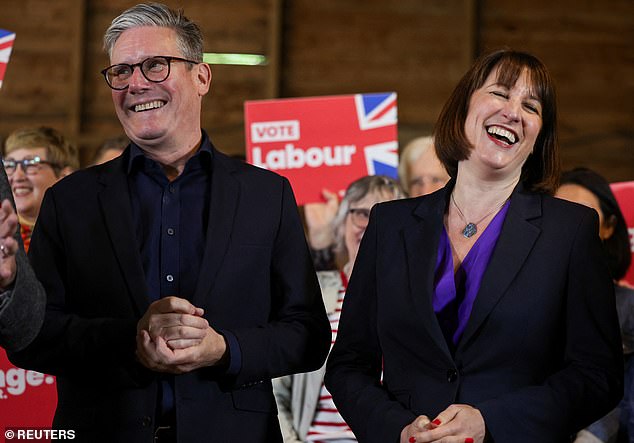Britain needs to think like a business to achieve growth: CHARLES WHITE-THOMSON
As Chancellor of the Exchequer Rachel Reeves delivers a scathing verdict on Britain’s finances, CHARLES WHITE-THOMSON, senior fellow at the Adam Smith Institute and former CEO, says we need to start thinking like a business to deliver the growth that can improve the UK’s position.
The Punch and Judy pre-election politics are now over. The Chancellor and the Prime Minister have made it very clear that we are now delivering on the growth plan.
The aim is for the UK to have the highest sustained growth within the G7.
Growth is the messenger, rather than pushing the country further into debt or increasing the already historically high tax burden.
Target: Charles White-Thomson is the former CEO of trading and investment firm Saxo UK
Our dire financial circumstances require that this plan be detailed and well executed, rather than a wish for the magic money tree or some form of alchemy.
Delivering sustainable growth is not easy and takes time. I applaud the commitment of Sir Keir Starmer and Rachel Reeves to put growth at the top of their priorities, with a strong focus on accountability, including ‘Mission Boards’ where they oversee and own results.
This is reminiscent of the private sector, where business plans are accompanied by clear deliverables and CEOs and CFOs are assessed, rewarded or punished based on their performance against these key objectives.
Businesses simply will not function if core objectives that drive growth, efficiency and profits are not rigorously met.
The private sector often talks about ‘the devil is in the detail’. This is an area where the UK growth plan falls short and requires immediate action.
This observation has also been picked up by the IFS, which speaks of a “conspiracy of silence” when it comes to the lack of detail.
Every major commitment or investment requires a numerical target and a time frame by which it must be achieved.
Five-year targets are too loose and require annual review. A proactive approach and proper accountability mechanisms are key components for success.
As a former CEO of a financial services company, I had to be detailed and transparent about the company’s goals, which we called key performance indicators (KPIs).
These KPIs were entered into an Excel file with a performance traffic light system and updated regularly.
Green means the KPI was met or exceeded, orange means the KPI was within 10 percent of the target, and red means the KPI deviated from the target by 10 percent or more.

Plan: Sir Keir Starmer and Chancellor of the Exchequer Rachel Reeves have committed to putting growth at the top of their priorities, with a strong focus on accountability
This provided a simple and logical way to assess the health of the business and see where we stood against our commitments or promises.
It also stimulated debate and discussion during the monthly town hall meetings.
In the same vein, the UK government should immediately identify its key objectives, in some cases take a decision on them and make them public.
This information should be available in one place, rather than having to surf through a bunch of different department websites.
This should take into account factors including GDP per capita, inflation, budget deficit, debt interest payments, maximum spending on key spending commitments such as the NHS, tax as a maximum percentage of net national income, immigration targets, new housing construction, recruitment of new teachers and infrastructure projects.
This will be an excellent summary for the Prime Minister to refer to as he updates the country.
It will enforce granularity, accountability and delivery. It will also ensure that the electorate is better informed and focused on our key performance drivers and how we are moving forward.
Elsewhere, government bodies that do not contribute meaningfully to these objectives or, in the case of the OBR, are partly directly responsible for delivering more of the same (the status quo) should be disbanded or reformed.
The government urgently needs to adopt best practices from the private sector.
As a UK shareholder, it is only right – in fact it is crucial – that you keep a close eye on how your money is spent and that you hold the government to account on the business plan or KPIs.
If it fails, we should not be surprised by tax rises, more debt, broken promises and a continuation of Britain’s narrow bailout.
DIY INVESTMENT PLATFORMS

AJ-Bel

AJ-Bel
Easy investing and ready-made portfolios

Hargreaves Lansdown

Hargreaves Lansdown
Free Fund Trading and Investment Ideas

interactive investor

interactive investor
Fixed investment costs from £4.99 per month

Saxo

Saxo
Get £200 back on trading fees

Trading 212

Trading 212
Free trading and no account fees
Affiliate links: If you purchase a product, This is Money may earn a commission. These deals are chosen by our editorial team because we think they are worth highlighting. This does not affect our editorial independence.
Some links in this article may be affiliate links. If you click on them, we may earn a small commission. That helps us fund This Is Money and keep it free. We do not write articles to promote products. We do not allow commercial relationships to influence our editorial independence.
